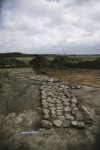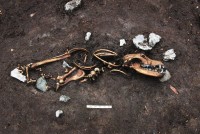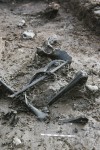 An excavation in Skødstrup, a suburb of Aarhus on the Jutland peninsula of central Denmark, has unearthed the remains of an entire Iron Age community dating to around the birth of Christ. Iron Age burials and sacrifices have been discovered before in the Skødstrup area. Just 500 feet away from the current excavation is a bog where sacrifices and offerings ranging from weapons to a baker’s dozen of dog remains have been found since digs began in the 19th century. Archaeologists were therefore optimistic that this excavation would reveal rich finds, but the depth and breadth of the discoveries surprised even them.
An excavation in Skødstrup, a suburb of Aarhus on the Jutland peninsula of central Denmark, has unearthed the remains of an entire Iron Age community dating to around the birth of Christ. Iron Age burials and sacrifices have been discovered before in the Skødstrup area. Just 500 feet away from the current excavation is a bog where sacrifices and offerings ranging from weapons to a baker’s dozen of dog remains have been found since digs began in the 19th century. Archaeologists were therefore optimistic that this excavation would reveal rich finds, but the depth and breadth of the discoveries surprised even them.
A previous excavation of the site found a burial ground. This season the team found the remains of a large Iron Age village with a cobblestone road in excellent condition and well-preserved floors of homes. In a low-lying area south of the village, archaeologists found human and animal bog sacrifices. The Skødstrup bogs were harvested for peat fuel by early Iron Age peoples. Their descendants a few hundreds of years later used the harvested spots for ritual purposes, placing the bodies of sacrificed humans and animals inside the peat cuts.
 Archaeologists so far this season have unearthed the skeletal remains of eight dogs and one human. The dog skeletons were found next to three tethering stakes. The human bones were found heaped next to two stakes, one of them sharpened. The skeletal remains were not complete but they were sufficient to identify the individual as a young woman in her twenties when she died. Most of the skull is missing — the jaw was all that could be found of the head — which suggests it may have been deliberately separated from the body perhaps for ritual purposes.
Archaeologists so far this season have unearthed the skeletal remains of eight dogs and one human. The dog skeletons were found next to three tethering stakes. The human bones were found heaped next to two stakes, one of them sharpened. The skeletal remains were not complete but they were sufficient to identify the individual as a young woman in her twenties when she died. Most of the skull is missing — the jaw was all that could be found of the head — which suggests it may have been deliberately separated from the body perhaps for ritual purposes.
The tethering stakes of are particular interest. Archaeologists believe they may reveal a previously unknown aspect of Iron Age sacrificial rituals.
“At Skødstrup, we have the whole spectrum of an Iron Age community: A well-structured village with an associated burial ground and sacrificial bogs. It gives us a unique insight into the life of Iron Age people in war and in peace, and not least a glimpse into their religious universe,” [excavation director Per] Mandrup said.
 The remains of the woman have been transported to Moesgaard Museum for further study in laboratory conditions.
The remains of the woman have been transported to Moesgaard Museum for further study in laboratory conditions.
I’ve always been fascinated by ancient Scandinavia, but the putting of people (and animals) in peat bogs gives me the heebie-jeebies.
Good share, thanks.
Terrific info. Thanks for posting it.
these people were barbarians and being this far north they were particularly out of the crossroads of Rome. I’d guess she was tethered down like an animal due to some cognitive defect, rather than some mysterious religious purpose.
Some remarkable conclusions in two sentences based on a short article about a recent find.
Barbarians, is what Rome named them but they certainly had some death rituals of their own.
Cognitive defect? Well, I’ll offer my counter-speculation that the Iron Age Danes were kinder to the vulnerable than most Romans.
Great website this, one of my favorites. Thanks
No need for speculation here, actually: Similar to most Greek states, the Roman ‘pater familias’ had every right to kill or sell even his healthy children into slavery.
:hattip:
Of course theory about the girl being tethered down like an animal is pure speculation, but why automatically associate tethering a person down with a religious ceremony? It could be something even more sinister, like she was tethered down as punishment as she was attacked by the dogs, and then the dogs were killed afterwards. She was in her 20’s and tethered down like a dog and died. These people (assuming they were celtic) were engaging in the wicker men burning, allegedly, around this time period; sure Caesar was running around Gaul, and Aarhus Denmark is 700 miles away but my state is 400 miles long and was traveled regularly precolumbian; and post columbian fur-trappers most definitely traveled throughout all of this wild land.